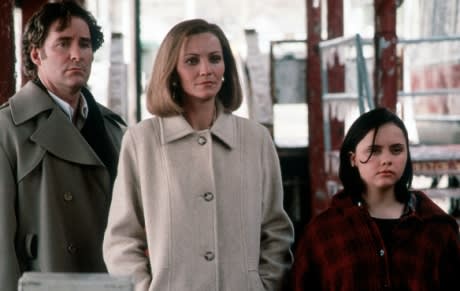Ten years after the assassination of JFK when Richard Nixon could be heard on televisions around America assertion that he was not a crook, the suburban landscape was changing, having lost the innocence associated with a nation founded on idealism and repressed misdeeds. The Ice Storm, Rick Moody's acerbic, satirical and ultimately Aristotelian critique of the era, mirrored the Watergate Scandal to the reckless nature of a changing nuclear family, sharing perspectives and reactions to the social climate within a tapestry of alcoholism and wanton, often passionless, sexual indulgence from parents and children alike. Ang Lee's adaptation doesn't necessarily negate the political implications, which Moody notes in an extensive interview included with the Criterion Blu-ray, but it does rearrange the story and its happenings in a way that hints at the presidential metaphor rather than making it central. The film is still, like the book, a story about two listless, dysfunctional families in suburban Connecticut, struggling to connect and define themselves now that liberation and the nationwide knowledge of hypocrisy and imperfection has inverted standard morality. Patriarch Ben Hood (Kevin Kline) has a casual affair with his neighbour Janey Carver (Sigourney Weaver), while his wife Elena (Joan Allen) attempts to recapture the youth she envies of her distanced, politically vocal daughter Wendy (Christina Ricci), by shoplifting and flirting with a local progressive priest. Wendy experiments sexually with both Carver boys, Mikey (Elijah Wood) and Sandy (Adam Hann-Byrd), almost out of obligation, having no present role models and a casual worldly disappointment her parents are only beginning to comprehend at a later point in life. These indiscretions and unapologetic deviations from Judeo-Christian normalcy are framed through the eyes of Ben and Elena's oldest child Paul (Tobey Maguire), who, while attending boarding school, similarly dabbles with the idea of sexuality despite suffering rejection and reminders of familial roots when his classmate Libbets (Katie Holmes) says he reminds her of a brother. Metaphorically, he mirrors the discontentment and interchangeable angst of his family with the Fantastic Four, noting that our birthright is both the void we emerge from and return to. This reluctant togetherness is further reiterated by the titular and visual trajectory of ice and water, with nature interfering and changing the landscape unpredictably, creating a stillness—a frozen landscape—where everything can stop temporarily giving some perspective and grounding a situation spiralling out of control. And though everything culminates with an ice storm occurring during a key party, where the adults lasciviously exchange spouses for a night of passionless indulgence, the focus here isn't on titillation and sensation so much as it is the lack thereof. Each parental figure attempts to connect with, or provide words of wisdom to, their children, but what they get in return is a knowing, world-wearied gaze suggesting that, sadly, they're on level playing field. Having lost their idols and, in turn, their guiding ethos, everyone experiments and pushes their boundaries to find feeling and meaning, having been desensitized to a cold, icy world. As framed by Lee, who channels Ozu in his use of composition and thematic rendering of a culture in flux, there's a darkly comic heartbreak to it all. His lingering imagery of ice-covered fields and overhead crane shots of teenagers methodically, indifferently kissing, has the pained, knowing eye of identification and pathos, capturing the beauty of listlessness and lost ideals in all its pain and confusion. As noted in the comprehensive documentary included with this Blu-ray, which was made for the 2007 Criterion DVD release, everyone involved is aware of what a powerful, timeless piece of filmmaking this is. They discuss its limited audience and the collective disappointment of its invisible presence at the time of release, noting how it's a film appreciated now more so than it was when it came out in the late '90s. What's particularly interesting about The Ice Storm is just how removed from the decay of time it really is. Were it not for the obvious youth of actors like Christina Ricci and Elijah Wood, this touching, astute and ultimately unifying interpretation and analysis of the family unit could pass as a new release, having a classical vision and a sense of integrity that transcends populist trends. This observation is mentioned briefly in the essay from Bill Krohn included with the Blu-ray, along with some other notes about the career of Ang Lee and the relationship of this story to America throughout the entirety of its history.
(Criterion)The Ice Storm [Blu-ray]
Ang Lee

BY Robert BellPublished Aug 10, 2013